Travellers from China will not be forced to take Covid tests on arrival or self-isolate even if they do take them and are positive, the Government has confirmed.
No10 is bringing back travel restrictions for passengers from the country’s mainland — apart from Hong Kong — amid a surge in cases that is blighting the nation.
These include having to present a negative lateral flow or PCR test before boarding any flight to London Heathrow or Manchester, the two airports direct Chinese flights arrive at.
But PCR tests used to track variants — like XBB.1.5, which has been nicknamed ‘the Kraken’ — that are available on arrival will not be made compulsory, the Department of Health and Social Care has revealed.
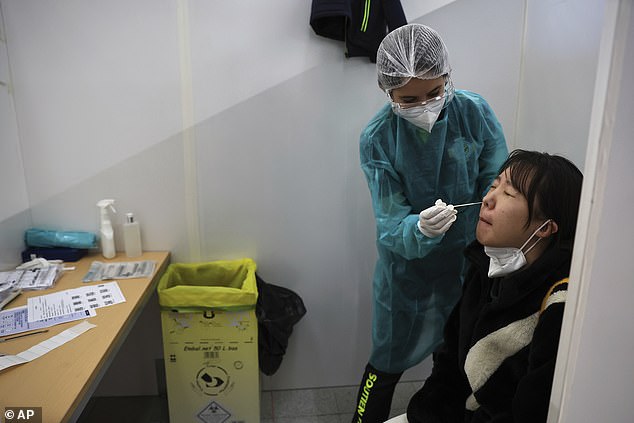
Pictured: A passenger arriving from China is tested for Covid at the Roissy Charles de Gaulle airport in Paris, France, on Sunday
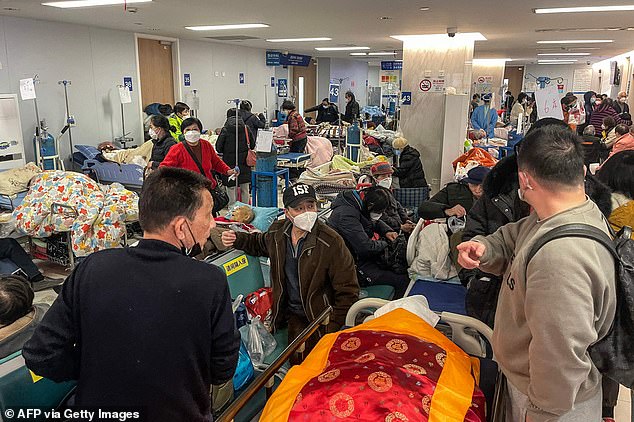
Pictured: Covid patients on stretchers are seen at Tongren hospital in Shanghai, China, today
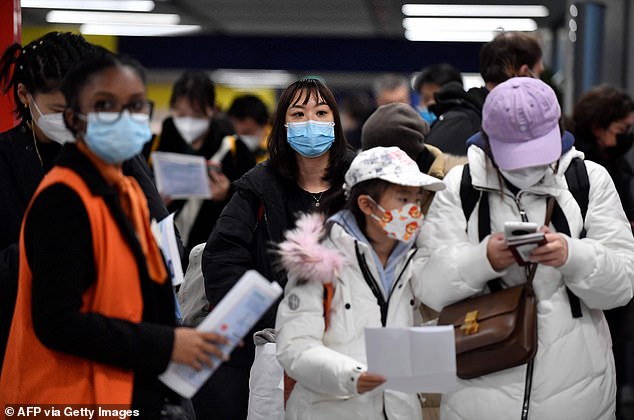
Pictured: Passengers of a flight from China wait in a line for checking their Covid vaccination documents at Charles de Gaulle airport in Paris, France, on Sunday
A DHSC spokesperson said: ‘We encourage people at the border to take a test to help themselves, their families and wider knowledge on Covid.
‘However the testing is optional and people can decline if they wish to do so.’
And, in stark contrast to other countries, passengers who do take a swab and test positive will not have to self-isolate, the Transport Secretary admitted today.
Asked they would be required to quarantine, Mark Harper told LBC: ‘No, because what we are doing is we are collecting that information for surveillance purposes.
‘But, look, one in 45 people in the United Kingdom have got Covid at the moment.’
The new travel restrictions were brought in on New Year’s Eve because of fears China’s outbreak could introduce a dangerous new variant in the UK.
Other countries, including the US, Canada, Italy, Japan, India, Spain, South Korea, Malaysia and France, all brought in similar measures to deal with the threat of potential doomsday strains.
Covid is currently overwhelming hospitals in China, after cases ballooned in the country when Beijing’s controversial ‘zero Covid’ policy was lifted in December.
Experts believe low vaccination levels combined with weak natural immunity caused by delaying lifting the policy is behind the sudden rise.
But they also fear the latest wave — which is thought to be causing more cases than ever in the country — could spawn the perfect breeding ground for a new variant.
China has also been accused of under-reporting its cases and withholding virus samples, reducing the likelihood of any new variant being spotted.
XBB.1.5 has already caused alarm in the US over its quick spread and a recent rise in hospitalisations. It is behind four in ten cases in the country, up from two a week ago.
The variant, which is a version of Omicron, has mutations that help it dodge protection from vaccination and prior infections. It has been spotted in Shanghai but it is not clear yet how dominant it might be in the country because of low testing.
Experts yesterday told MailOnline that the strain is a ‘wakeup call’ and could worsen the NHS crisis, which has seen the health service battered by a ‘twindemic’ of Covid and flu.
The pressure on the NHS — thought to be higher than during the peak of the pandemic — has already led to new Government advice to wear a face mask if you feel unwell.
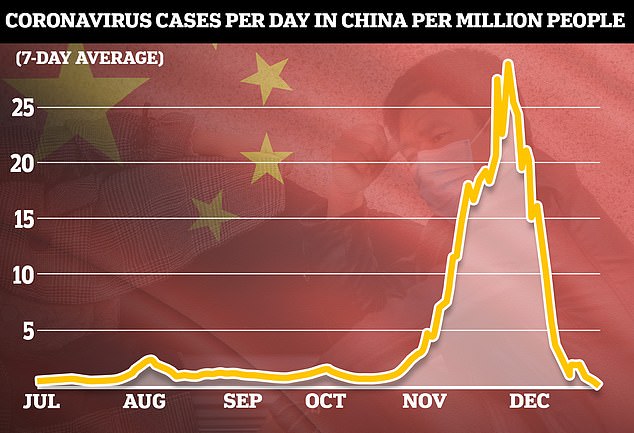
The Our World in Data graph shows the daily confirmed Covid cases in China. The Chinese Center for Disease Control and Prevention last week stopped reporting daily cases, without providing a reason. It reported around 5,000 cases per day last week and a small number of deaths. However, some estimates suggest China is actually experiencing one million cases per day and 5,000 deaths
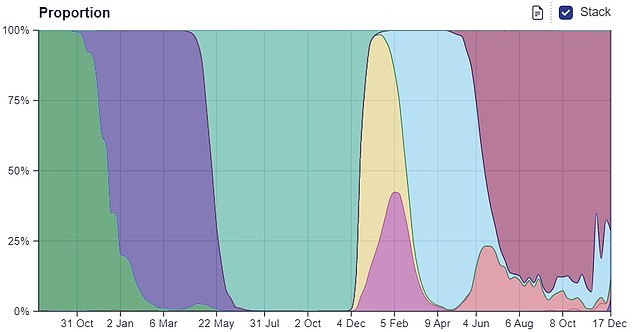
Figures from the Sanger Institute, one of the UK’s largest Covid surveillance centres, shows 4 per cent of cases in the week to December 17 were caused by XBB.1.5 (shown in purple, bottom right corner)
Meanwhile, sequencing data suggests that a different Omicron sub-variant — BF.7 — is on the rise in China, causing 35.3 per cent of positive cases that have been studied in laboratories.
Beijing is planning to ease its own international travel restrictions on January 8, allowing more citizens to go to the UK and other countries.
Ministers have said they plan to test a ‘sample’ of passengers on arrival to check for variants.
But people coming from the country — who have already tested before boarding the plane — will be allowed to simply decline a second test on arrival if they choose, raising the risk they could be positive and go undetected.
This contrasts to countries like Japan, which tests all passengers that have been in mainland China in the last seven days and quarantines them if they test positive.
Asked about the UK’s policy, Mr Harper said: ‘We manage Covid now by making sure we have got very high levels of vaccination, that is why people who are at risk, older members of the community for example, should make sure they get their fourth booster shot this winter.
‘That is how we protect people from Covid, that is our primary line of defence.
‘The policy for arrivals from China is primarily about collecting information that the Chinese government are not sharing with the international community.’
Mr Harper said the UK Government has created a ‘sensible, balanced proposition’ to deal with the potential spread of Covid from China.
He said: ‘This is about a country, China, which isn’t sharing the health data with the global health system that we expect everybody to do.
‘That is why we have put this temporary precautionary measure in place as China opens up its borders.
‘We are doing two things — we are requiring people who fly from China to have a pre-departure test so they have got to show that they are negative before they get on that flight, and when they get to the United Kingdom the UK Health Security Agency will take a sample of passengers and test them.
‘That is so that we get that information into our health system and we can track the virus that is coming from China.
‘That, I think, is a very sensible, balanced proposition which I think helps keep people in the UK safe but doesn’t put any restrictions on how people in the UK are able to operate.’
Mr Harper also said wearing a mask is ‘sensible’ if people need to go out while ill.
Asked if he would wear a mask if he was ill with coronavirus, he told LBC: ‘First of all you should stay at home if you think you have got Covid or you have got flu — actually the most sensible thing to do is to not go out and spread it.
‘If you do go out, clearly wearing a mask is very sensible if you are ill. But we manage these illnesses now by vaccination.
‘People should get vaccinated for Covid, they should also get a flu vaccination. We have seen very high levels of flu this winter.’











